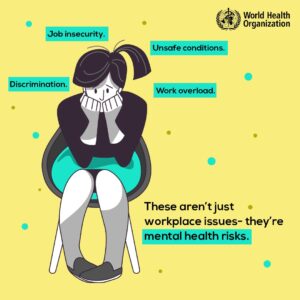By Leonard Kamugisha Akida,
KAMPALA
Toxic workplace cultures are fueling stress, burnout and employee resignations, a Ugandan mental health advocate, Dr. Martin Bakundana warned on Saturday, calling on employers to treat staff well-being as a core business priority rather than an afterthought.
In an exclusive interview with Parrots Media at a mental health awareness sports gala at City High School Kololo, Dr. Bakundana, who is the founder of Lem Mindfulness, a mental health enterprise in Uganda, said many organizations lack systems to address workplace toxicity, leaving employees vulnerable to psychological harm.
“Many organizations don’t have a system of dealing with toxicity at the workplace,” Bakundana said. “You find a boss who is not relating well with subordinates, or colleagues locked in conflict. If that is not addressed, it festers; employees resign, or undergo so much stress that work becomes unbearable.”
His remarks come as global institutions raise alarms about mental health in the workforce. The World Health Organization estimates nearly 15 percent of working-age adults live with a mental disorder. Depression and anxiety alone cost the global economy about $1 trillion each year in lost productivity, while only 35 percent of workplaces have promotion programs in place.
… workers taking mental health leaves have increased by 300% since 2019
The International Labour Organization has described psychosocial risks at work as “among the most challenging issues in occupational safety and health today,” while the World Economic Forum has called mental well-being a decisive factor in the future of corporate innovation.
A separate study by behavior services provider, ComPsych revealed that workers taking mental health leaves have increased by 300% since 2019. The data analysis from over six million global employees revealed that the percentage of workers taking a leave of absence also increased by 30% from 2019 to 2024. ComPsych clinical officer Jennifer Birdsall attributes the leaves to uncertain economic conditions caused by the COVID-19 pandemic which left millions of employees stigmatized, asking for mental health support. The data further showed that employees should rethink how they approach managing absences and handling employees well-being.
Bakundana said Ugandan employers must go beyond wellness days and perks to build supportive cultures. That includes providing health insurance that covers mental health services, inviting specialists to engage staff, and creating safe channels to resolve conflicts.
“We’ve seen employees commit suicide, collapse at work, or walk away from jobs because of unmanaged stress,” he said. “Corporate wellness programs are not optional, they save lives and strengthen organizations.”

The Kampala event, organized by Gracy Minds Empowerment Initiative Uganda, TPO and other partners, brought together civil society groups, employers and mental health advocates. Organizers said the aim was to highlight the link between well-being and productivity, while encouraging companies to confront stigma around mental health.
Bakundana urged businesses to sponsor regular activities such as workouts, retreats and mindfulness sessions, as well as family-friendly measures like facilities for nursing mothers. “When employees know they are supported, they perform better,” he said.
He also emphasized partnerships between NGOs, government and private sector as key to scaling solutions. “We cannot occupy the entire space,” he said. “By collaborating with others; from nutrition to sports to parenting, we can make mental health part of everyday workplace practice.”








































